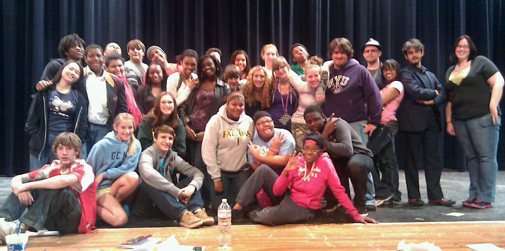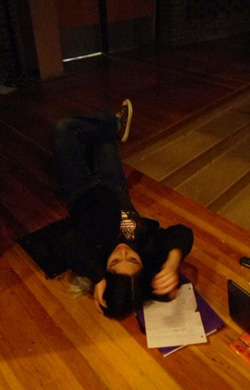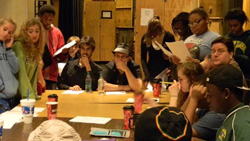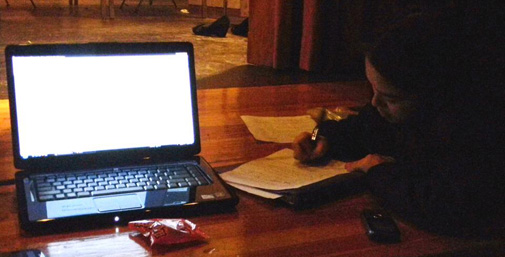The Last Word:
The 24-Hour Theatre Process: A Training Opportunity for Young Stage Managers

The actors, writers, directors, playwrights, and stage managers of Firestone's 24-Hour Theatre Project '11.
Photos/Elynmarie Kazle
I thought it would be just another performance opportunity for our students, but it has become so much more. I now understand that a 24-hour theatre project is an outstanding and indispensible stage management training ground.
I received early Leadership Learning in USITT. There were not many students involved at the board or committee levels of USITT when I first joined as a college student. Projects were encouraged, but 30 years ago we were a young organization, and we were just getting our wings. Through the urging of Dick Durst, Pat Dennis, and my other teachers at the University of Minnesota - Deluth, I was encouraged to join the USITT conference adventure in Overland Park, Kansas. That week in 1980 opened a door for me, and I have never looked back.
In USITT, I found mentors, encouragers, discouragers (of bad behavior) as well as the folks who wrote and were the stuff of my text books. Soon I found myself on the board and, through the encouragement of many fine theatre professionals including Joel Rubin, Dick Devin, Chris Kaiser, and Bill Byrnes, developing the first Stage Management Mentoring Project (SMMP).

I think I'll sleep on it.
I eventually turned the successful project over to the first in a line of outstanding SMMP leaders. I was then able to apply my efforts locally, developing a stage management training program and mentoring project as part of the Vocational Theatre Program for the Akron Public Schools at Firestone High School. We are several years into the ongoing stage management training, and as of last year, our numbers of currently trained stage managers swelled to 24. How to train this growing number of eager students in the practical skills of stage management became my challenge.
To find something new and challenging for his budding actors and directors, Mark A. Zimmerman, theatre director, created the first 24-Hour Theatre Project for the school’s program. It was at about hour number 18 of that first project that I realized what a fantastic training ground this was for my stage management students.
Firestone did not invent the concept of the 24-Hour Theatre Project, but I am not aware of many high schools taking it on. It works like this: actors, directors, stage managers, and writers meet for the first time at 8 p.m. on a Friday night. Introductions are made and the directors, with their writers, go through an audition process for a play yet to be written. The actors are dismissed to go home and sleep in their own beds while the writers go to work.
The schedule then allows time for stage managers and directors to get to know one another and plan out the process before the first bits of information begin to emerge. Casts are divided so initial planning of rehearsal spaces and assignments can be made. Around midnight, first drafts begin to emerge and more planning can be done. The stage managers assist in first reads if necessary, and the playwright mentors work with all on making improvements to each script. Directors and SMs then try to get a cat nap while the writers take the next round.
About 3 or 4 a.m., the final drafts emerge, and the stage managers arrange for the first reads making copies and setting up rehearsal rooms at the school. At 7 a.m. the actors and heads of lighting, sound, set, and props arrive for breakfast followed by the first reading of all of the scripts -- each being 10 to 20 minutes in length. Rehearsals begin, and the writers head off for a nap keeping close by to be consulted if major changes need to be made. Stage managers then work with the heads of the technical departments to pull props, small set pieces, costumes, and so forth and get them into rehearsal.

30 Teenagers from Firestone Theatre working until the wee hours at the school to create four new plays.
Lunch is served mid-day, and each play gets some spacing time on stage followed by technical rehearsals. Each stage manager runs either lights or sound, and the others help out. Cat naps are encouraged for those not directly involved in a piece. Dinner is served, followed by a single performance of each play.
This is a process in which stage managers get to undertake --hands on-- everything they do in a regular rehearsal process. They do it all in the same 24-hour period. They experience the entire process from auditions to performance, practicing skills such as taping down a set, communicating on a headset, blocking, taking notes, pulling props, and calling the performance. It is a crazy night, but I can say that it has developed some of the best stage managers I have.
I would not, could not, would never have had the confidence to build this program (which will have about 30 trained stage managers serving as the house crew for our 150 events throughout the year here at Firestone in 2012-13) if it had not been for the early and continuing leadership training, mentoring, and support I found as a member of USITT.
I encourage anyone who is interested in this type of personal development to get involved in a leadership role in USITT, and to be a part of keeping the leadership in our business highly trained, motivated, and well able to support the creative process.

Technology left behind. It's back to the paper and the pen.

